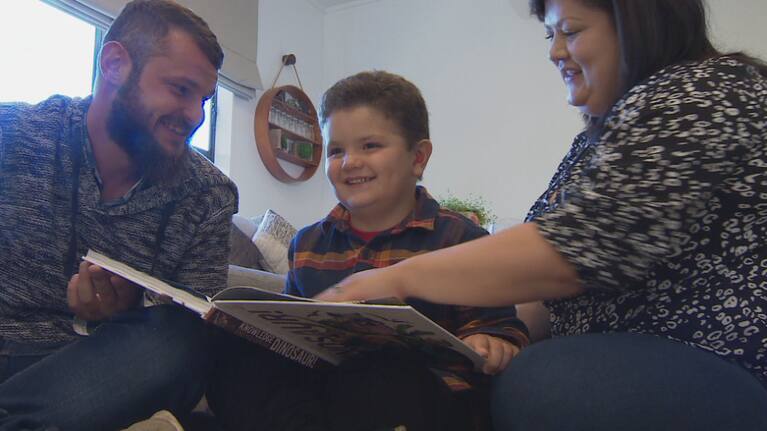Matthew Irving loves Mario, Lego and learning about dinosaurs. He's just like any other boy but for his severe hearing loss.
The South African boy's condition is now posing a risk to his immigration status in New Zealand - preventing him from going to school with his peers.
This month his parents, Nicole and Harry Irving, were told it had gotten worse - dashing their hopes of getting him a student visa, which was more likely to be approved if his hearing had at least stabilised. He needs the visa to go to primary school for more than one term.
"Unfortunately, his hearing has gotten so bad, his hearing aids have been pushed to the max and they don't know how long it's going to last," says Matthew's dad.
The school-aged boy came here with his parents - who have visas valid till 2023. His father is a plumber and came on an essential skills work visa, his mother on a partner visa. Back then they say the information they received was that Matthew's age, not his hearing prevented him from getting a student visa and so he came on a visitor visa.
But this year, Immigration New Zealand (INZ) told the parents, in a letter seen by 1 NEWS, that his hearing loss and speech delays could require costly support from the public health system. And unless Matthew's hearing improves or at least stabilises it was unlikely his application would get approved.
In a statement an INZ spokesperson adds it is a requirement that all non-New Zealanders coming here, must have an "acceptable standard of health" so as "not to impose undue costs".
Do you have your own immigration story to share? Contact Corazon.Miller@tvnz.co.nz

However, Nicole says it is unlikely her son's hearing would improve and is therefore pleading with authorities to at the very least allow him to go to school.
"What do they expect me to do to give him a basic education, so he is not even more disadvantaged because of his hearing?"
She says because of his hearing, his speech is delayed, so an education was vital to ensuring he caught up with his peers.
"We don't know where to go from here if his student visa does get declined," she says. "We are looking at maybe home-schooling."
And Harry says Matthew struggles to understand why he isn't allowed to go to school with his peers.
"He doesn't understand why we are taking away his opportunity to make friends at this young age."

Matthew's parents say they understand that by law anyone who posed a significant cost to the public health care system was likely to be declined a visa. But they question why this was not made more clear before they left South Africa, when they'd provided all Matthew's health information at that point.
"We are funding everything ourselves and we will look to fund everything ourselves going forward," Nicole says. But she says it cost them a lot to leave everything behind in South Africa and come to New Zealand.
"We decided we wanted to build a future with our boys where it would mean something to them," she says."If we had known that we would never be able to get a student visa just to get a basic education we would have made different decisions."
The INZ spokesperson says Matthew was deemed to have an acceptable standard of health for a visitor's visa in 2020, which allows him to attend kindergarten or preschool. It also enables him to attend primary school for one term.
"Matthew's parents were advised that any further visa application would require additional information to support the application - including specialist assessments of Matthew's hearing and speech and language needs," the spokesperson says.
INZ adds whether or not the parents can afford to pay for the additional support Matthew's needs have no bearing on the visa outcome. A final decision on his visa is still pending.
The couple have recently set up a Givealittle page to help raise funds for a cochlear implant for Matthew, which they acknowledge would still require asking others for help, but say at least it doesn't fall to the New Zealand Government.
"The people of New Zealand have shown us their generosity," Nicole says. "We are very grateful for the support we have been given."

But Green MP Golriz Ghahraman says as taxpayers the parents should be entitled to some access to public funds.
"They are here paying tax and contributing to our society, it is time for us to stop pretending it is an absolute privilege for migrants to come here, because actually it is a two way street," she says.
Ghahraman says INZ was acting within the law, but it was perhaps time to look at the law and change it to reflect our role as signatories on the UN Charter for People with Disabilities.
"The idea is that we will give each person what they need to thrive and live as part of our community," she says. "Disabled people have an absolute right to education and health care."
For now the Irving family is left hoping for an exemption to a law, one that is seemingly weighted against those living with a disability.
"Currently we are hoping and praying for a miracle," Nicole says.



















SHARE ME